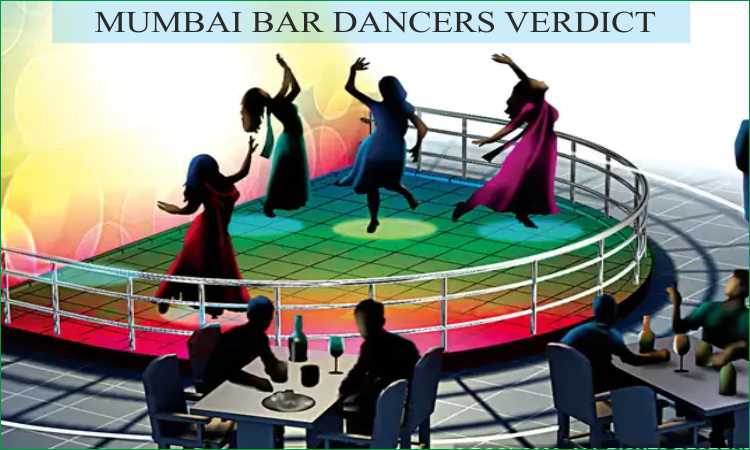Indian Hotel and Restaurant Association
v.
State of Maharashtra
Fact & Issues -
A batch of three writ petitions were preferred under Article 32 of the Indian Constitution challenging certain specific provisions of the Maharashtra Prohibition of Obscene Dance in Hotels, Restaurant and Bar Rooms and Protection of Dignity of Women (Working therein) Act, 2016 and the Maharashtra Prohibition of Obscene Dance in Hotels, Restaurant and Bar Rooms and Protection of Dignity of Women (Working therein) Rules, 2016 being violative of the fundamental rights of petitioners guaranteed by the Indian Constitution namely under Arts. 14, 15, 19 (1) (a), 19 (1) (g), and 21. The petition represented a large no. of female dancers, singers and waitresses.
The respondents comprising of various departments and authorities of the State alleged that prostitution rackets were being run in the hotel premises under the veil of dance programmes being conducted ; where such dance forms have been considered ‘obscene’ by the state.
You can also read the Blog by visiting [Blog]
For more information, visit [Aashayein Enquiry Section]
Decision -
A three judges bench of Justice A K Sikri, Justice Abdul Nazeer and Justice Ashok Bhushan allowed the reopening of dance bars in Mumbai supplemented with relaxation in the strict rules imposed. The judgement is being explained in the form of following points:-
- The court struck down Section 6(4) of the impugned Act which prohibited granting license to the discotheques or orchestra.
- The Apex court held that the rule that dance bars instead of being in the vicinity of religious places and educational institutions should be at a distance of 1 km is unreasonable and arbitrary.
- The court observed that the provision of written contracts between the employer and the female performers, depositing the remuneration in the bank accounts and submission of the written contracts with that of the licensing authority is valid. However imposing restrictions by the employer on the employees to move from one dance bar to another in case the conditions prove to be unsuitable for them in terms of salary and monetizing their performances is unreasonable on the part of employers being violative of Article 19 (1) (g) and therefore has been relaxed.
- The court observed that the fixing the time of operation of dance bars between 6:00 pm- 11:30 pm is reasonable and the state is under power to restrict the timings.
- The rule regarding prohibition of serving liquor in the vicinity of areas of dance or stage performances has been relaxed by the apex court saying that state is under the wrong impression that persons would misbehave with the performers after consuming alcohol. However if this is the presumption then the same might happen with the female waitresses in the bar area where liquor is served.
- The apex court has quashed the condition mandating the installation of CCTV cameras as it amounts to invasion of the right to privacy being violative of Arts. 14, 19 (1) (a) and 21 of the Constitution citing the judgement in the famous KS Puttaswamy case.
- The apex court struck down the provision requiring the partition between the permit room (bar room) and the dance floor as unreasonable. However it does not raise any objection to the condition of the stage in the bar room to be of not less than 10 feet x 12 feet.
- The court upheld the provision prohibiting the throwing of coins, cash, article or anything capable of being monetised on the stage. Even though the state cannot restrict ways of tipping therefore personally handing over the money to the performers has been held not to be inappropriate. The provision of giving the tips only by adding the name in the bills also has been set aside by the court. This was a step towards protecting and maintaining the ‘dignity of women’.
- The apex court has struck down the provisions mandating the owner of the dance bar to be of ‘good character’ having no ‘past criminal records’ ; saying that there is no exact and precise definition as to what amounts to ‘good character and criminal antecedents’ .
The court thus observed that the strict prohibition on any form of dancing in the establishments mentioned under sects 33-A and 33-B of the impugned Act (The Bombay Police Act, 1951 vide 2005 Amendment) along with strict licensing rules had led to the shutting down of the establishments resulting in the unemployment of 75,000 female workers. Further leading to the fact brought on record that many of these women had to in turn take up prostitution in order to avail resources for maintaining their families. Therefore the above mentioned provisions namely sections 33A and 33 B had been struck down as unconstitutional being violative of Arts, 14 and 19 (1) (g) of the constitution. The court observed that even if the impugned legislation appeared to be regulatory it ultimately resulted in the prohibition of dance bars completely owing to stringent rules prescribed by it. Therefore the apex court aimed at reviving the right to carry profession and livelihood of the female performers/workers and dance bar owners by means of relaxing certain rules.

